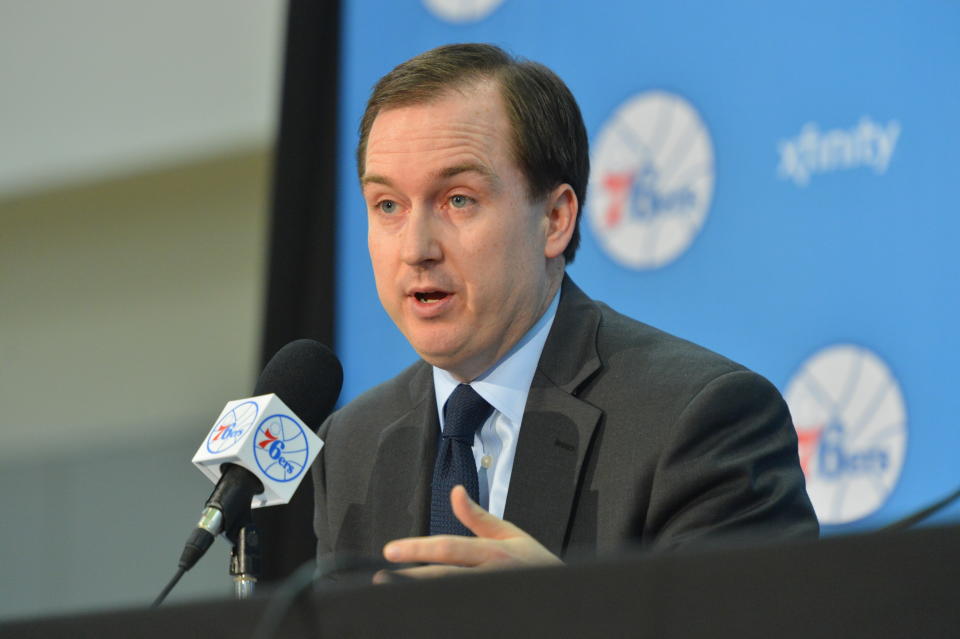Inside the NBA's mission to abolish tanking
Few issues in the NBA are as polarizing as lottery reform. To the majority of small-market teams, any tweaks to the draft system, no matter how well intentioned, represent another roadblock toward acquiring top talent. To larger-market teams, as well as some small-market executives weary of watching late-season tanking, reform is necessary to protect the integrity of the game.
It’s been three years since the NBA failed to pass lottery reform, its proposal blocked by a coalition spearheaded by Philadelphia and Oklahoma City. This week the league plans to submit a new proposal to the competition committee, with suggested implementation in 2019. The details, first reported by ESPN, include a flattening of the odds to land the No. 1 pick among the four teams with the worst record – 14 percent for the bottom three teams, 12.5 percent for the fourth, league sources told The Vertical – a change from the current system, which rewards the team with the worst record with the best odds of securing the top pick. The lottery would be expanded to include the top four slots, with teams slotted by record from fifth on.
[Now’s the time to sign up for Fantasy Basketball! Join for free]
As a result of the flattened odds, teams outside the bottom four would see their chances to land a top pick increase as well. This is where the league’s proposal could help small-market teams; try to compete, land in the mid-lottery and see your chances of hitting on a top-four pick improve.
NBA commissioner Adam Silver has championed lottery reform, seeing it as the only way to halt strategic tanking. While no franchise has attempted the unprecedented disassembly the 76ers underwent from 2013-2016 – yet – the league still sees tanking as a significant issue. Last season, Phoenix, which shut down several key players after the All-Star break, devolved into a national embarrassment. When asked in mid-March why starting point guard Eric Bledsoe wasn’t playing, Suns coach Earl Watson brazenly declared it a “management decision.”
By flattening the odds for the worst teams, the league believes it will disincentivize a race to the bottom. Late-season games will be better, while fans and local television partners will get an improved product.

The argument against lottery reform is simple: You don’t have to tank to be really bad. It’s a position many small-market teams have coalesced around. This summer was a bloodbath for small-market teams. Utah, on the brink of taking a major step forward, lost Gordon Hayward to Boston. Indiana, fearful of Paul George’s threats to leave for Los Angeles in 2018, flipped him to Oklahoma City. Next summer could be worse: Oklahoma City could lose George and Russell Westbrook. Cleveland could see LeBron James skip town. New Orleans, with Anthony Davis’ free agency looming in 2020, could be forced to move him.
Anti-reform advocates argue that small-market teams need high draft picks to rebuild. Top free agents don’t flock there anyway – James, with Northeast Ohio roots, and LaMarcus Aldridge, who signed on to be the missing piece to an iconic franchise’s championship puzzle, are considered exceptions – and luring them while rebuilding is next to impossible. To some teams, the draft is the only opportunity to seize top talent.
Lottery reform makes acquiring that talent more difficult, small-market team officials contend. Take Cleveland. If James leaves, the Cavaliers will likely be forced into a lengthy rebuild. They will lose – a lot. A couple of years with top-three picks would establish a foundation for the future. Lottery reform, however, would likely increase the team’s chances of drafting outside the top four, making a rebuild far more challenging.
Said one small-market team executive: “For one of these [small-market] teams, lottery reform will be a death sentence.”
Instead of lottery reform, several team officials say they would like to see the NBA find alternative methods to go after tanking teams. In one way, they already have. The architect of the NBA’s most notorious tankers – former Sixers GM Sam Hinkie – was ousted after the league engineered Jerry Colangelo’s arrival in Philadelphia. Would another GM attempt a Philadelphia-type rebuild if he knew the league’s disapproval could cause him to lose his job?
That there has not been another Sixers-level rebuild is viewed by some as a sign of progress. And while there is universal disdain for what Phoenix did last season, the potential for hamstringing franchises that are victimized by factors out of their control outweighs any desire to shut down Suns-like tanking.
Still, there is cautious optimism that a reform proposal could pass this time around – with an emphasis on cautious. Three years ago the league thought it would pass lottery reform in a landslide, only to see support crumble in the days leading up to the vote. While league and team officials believe the new proposal will gain wider acceptance, there will be uneasiness until each of the 23 votes needed to pass is counted.
The NBA wants tanking out of the news cycle, and the reform proposal would be a significant step toward that. But if the cost is the crippling of small-market franchises – and this is where it’s important to note that league officials strongly believe it will not – will it be worth it? If lottery reform solves one problem, will it create a new one? The NBA is determined to find out.
More from Yahoo Sports:
• Sideline reporter explains awkward ‘Monday Night Football’ moment
• NFL Power Rankings: Who replaces Pats as No. 1?
• Curry takes strong stance on Kaepernick’s NFL status
• Pat Forde: The ugly truth about racism and coaches in the NCAA

